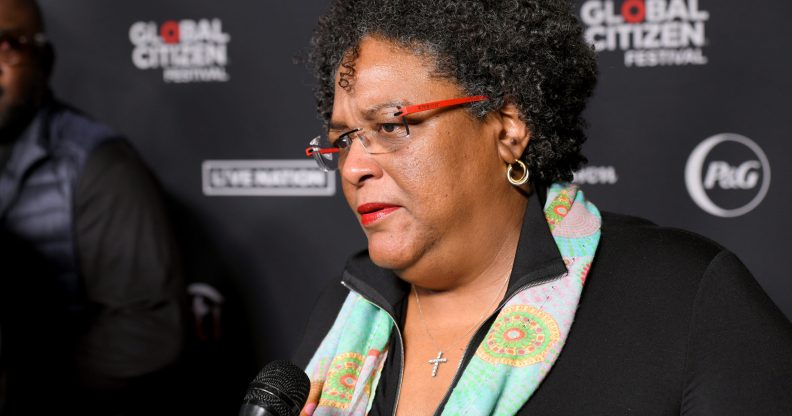BBC journalist had the gall to ask Barbados’ prime minister if people should be ‘allowed’ to be gay. She didn’t hold back

Barbados Prime Minister Mia Mottley attends the 2019 Global Citizen Festival: Power The Movement in Central Park on September 28, 2019 in New York City. (Noam Galai/Getty Images for Global Citizen)
A BBC journalist asked the prime minister of Barbados, Mia Mottley, if people should be “allowed” to be gay – and she did not hold back.
Mottley appeared on BBC News to discuss revived plans for the Caribbean island to remove the queen as its head of state and become a republic.
In the interview with BBC journalist Christian Fraser, Mottley spoke about constitutional reform in Barbados, and the topic of LGBT+ rights came up.
Barbados recently agreed to recognise same-sex civil unions, as the tiny island nation unpicks its colonial-era homosexuality laws.
Although the government asserted that it is not yet allowing same-sex marriage, it has agreed to put the matter to a referendum and “be guided by the vote of the public”.
Referencing the upcoming referendum, Fraser asked the prime minister: “For that next generation, should they be allowed to be gay in Barbados?”
Looking incredulous, Mottley said: “Sorry?”
But Fraser persisted with the question, repeating more slowly: “Should people in Barbados be allowed to be gay, to be homosexual?”
Mottley, who has taken a progressive stance on LGBT+ rights in Barbados, was quick to put the journalist in his place.
She said: “Is that a question you would ask the United Kingdom?”
Fraser refused to back down, adding: “Well, we have laws on gay marriage and you’re having a referendum on gay marriage.”
The irony that the colonial-era laws which oppress LGBT+ people in Barbados were put in place by the British escaped the BBC journalist.
During an interview on BBC News, Barbados Prime Minister Mia Mottley was asked if people should be “allowed” to be gay in Barbados.
Her response:pic.twitter.com/PT0UDPH7je
— Dionne Grant (@DionneGrant) September 20, 2020
Mottley continued: “I think that is a most inappropriate question as to whether a person should be ‘allowed’ to be gay.
“I think the question is, should we discriminate against people because they’re gay? And we will not.
“We are absolutely clear that Barbados became the first Black slave society, and a country that has known what it is to discriminate against citizens for centuries cannot in today’s world be discriminating against any human being for any reason whatsoever.”
Explaining the referendum on same-sex marriage, she continued: “The government is resolute that marriage is a function of the church, and to that extent, a referendum will be held to allow all parties to determine whether they will speak on marriage or not.
“With respect to civil unions, we believe that that is a function of civil rights, and to that extent there shall be no discrimination against any person, whether gay, whether straight, whether Black, whether white, whether short, whether tall, for any reason in this country.”

